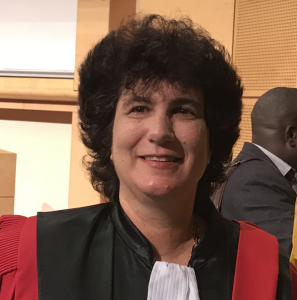LAW – Roma Tre University honors judge Daphne Barak Erez
 Daphne Barak Erez, one of Israel’s most distinguished legal scholars, has been a justice on the Israeli Supreme Court since 2012 and is a former dean of the Tel Aviv University Faculty of Law. She is also the author of over 20 books, several of which have been translated into Italian. In Il femminismo giuridico e la sfera pubblica (Legal Feminism and the Public Sphere), published by Il Mulino, Barak Erez explores the intersection of private and public spheres, addressing issues like domestic violence, traditionally considered private matters, within a broader societal context.
Daphne Barak Erez, one of Israel’s most distinguished legal scholars, has been a justice on the Israeli Supreme Court since 2012 and is a former dean of the Tel Aviv University Faculty of Law. She is also the author of over 20 books, several of which have been translated into Italian. In Il femminismo giuridico e la sfera pubblica (Legal Feminism and the Public Sphere), published by Il Mulino, Barak Erez explores the intersection of private and public spheres, addressing issues like domestic violence, traditionally considered private matters, within a broader societal context.
On December 16, Barak Erez received an honorary degree in Law from Roma Tre University. “This award recognizes a remarkable legal scholar, known internationally for the depth and originality of her research, as well as for her rigorous commitment as a judge,” said Giulio Napolitano, professor of Administrative Law at Roma Tre University, in an interview with Pagine Ebraiche.
Napolitano delivered the laudation in Barak Erez’s honor during the ceremony at the university’s main hall, highlighting her profound contributions to various legal fields, including administrative and constitutional law, comparative public law, global administrative law, the history of Israeli law, and legal and judicial feminism.
Barak Erez’s nomination for the honorary degree was made nearly two years ago, well before “the recent escalation of events in the Middle East,” Napolitano emphasized, referring to developments since October 7. “These events do not alter our reasoning or evaluation of her merits,” he explained.
The recognition honors a figure who embodies “wisdom, knowledge, and sensitivity,” qualities reflected in her work on the Israeli Supreme Court, where she has steadfastly upheld the rule of law, protected individual freedoms, and ensured the equitable and just application of public law.
According to Napolitano, Barak Erez exemplifies a rare blend of “academic excellence and judicial wisdom.” Her work, both academic and judicial, continues to shape legal thought globally, reinforcing her legacy as a defender of justice, equality, and public integrity, not only in Israel but on the international legal stage.
